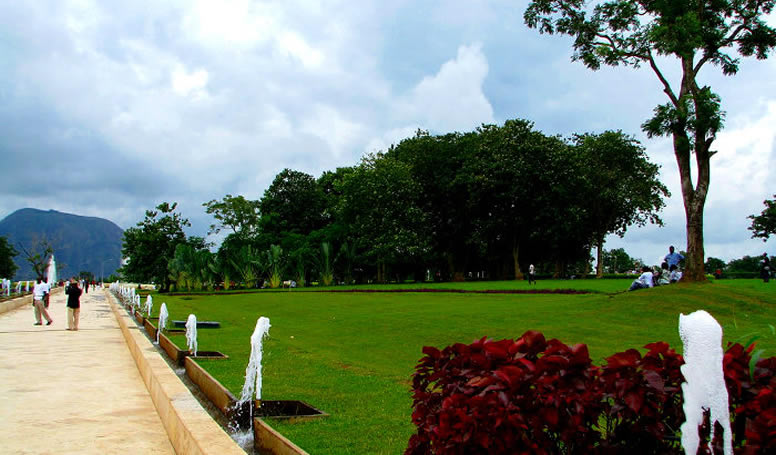Plastic pollution: Millennium Park offers sustainable solution
Millennium Park, Abuja’s greenest recreation area, has come up with an innovative way of controlling plastic pollution, which is a major challenge for the Nigerian environment in the face of the climate change crisis. Daily Trust observed that every single plastic used in the park is picked and dropped in big baskets hung on trees […]

millennium park abuja
Millennium Park, Abuja’s greenest recreation area, has come up with an innovative way of controlling plastic pollution, which is a major challenge for the Nigerian environment in the face of the climate change crisis.
Daily Trust observed that every single plastic used in the park is picked and dropped in big baskets hung on trees at strategic positions in the sprawling, alluring park, thereby ridding it of plastic litter, a sight that is common in almost every public place in Nigeria.
Nigeria is estimated to generate about 2.5 million tonnes of plastic waste annually and the situation is expected to worsen as population increases and more companies produce plastics.
However, an environmental activist, Aliyu Sadiq, said the solution lies in recycling, which is also an important component of the circular economy.
FG, Ogun empower farmers with solar irrigating machines
FG targets 840,000 jobs from energy transition
He said the efforts by the Millennium Park managers was commendable and advised that it should be replicated in every public place.
Sadiq said, “It is really a good initiative in terms of promoting behavioural change on sorting, first of all; because these are mounted in public places and having them in a lot of public places like parks, schools and other places where people gather, even football clubs or fields can give people a sense of responsibility to know where and how to dispose of their plastics. Ordinarily, seeing this alone would tell you that don’t throw plastics anywhere.
“Secondly, it helps the plastic recycling companies recover the raw materials (plastic bottles) easily from the collection hubs, which is now part of the recycling and the circular economy.”
The environmentalist, who is the Executive Director of Ecocykle Development Foundation in Abuja, said there should be support from government and development partners so that such initiatives could be taken to the nooks and crannies of the country.
“There should be more support for some of these initiatives to get them to be positioned in public places. It has a way that once it is filled up, it will be opened and all the plastics are extracted and then covered again and you can’t even steal what is inside. Only the organization which is managing it opens it. So it is a very wonderful initiative.
“We wouldn’t talk about recycling without the problem, and the problem is plastic pollution. Plastic has become a very big problem to society because of its inability to degrade; that is to break down into decomposable materials. It remains in the environment for over 300-400 hundred years without decomposing. And there has been a lot of research that has shown how harmful plastic is to aquatic life and even human beings.
He insisted that recycling is a sustainable solution and it discourages use of new materials to produce new plastics. “Using new materials means you are using crude oil and you are contributing to climate change. Recycling means recovering those that are in the environment and using them as raw materials to reproduce new ones. But this cannot happen without involving people who use them, because they generate waste.
“Sorting is the most difficult part of recycling and if it is not done at source, it becomes a problem.”
He therefore, said sorting should be encouraged from the source so that it would reduce the cost of sorting incurred by recycling companies, which will in turn create more jobs in the circular economy.
Responding, the Director Parks and Recreation, Isaiah Ukpanah, said he would ensure all parks in the capital city replicate that kind of arrangement in Millennium Park so that plastic waste would be controlled in the city.
He insisted that Abuja is a green city and he would ensure all wastes are properly managed.
“We have interfaced with a lot of environmental managers who are coming up with a lot of ideas on how to manage plastics in the city. So the issue of Jabi Lake will be looked at and solved,” he said.
